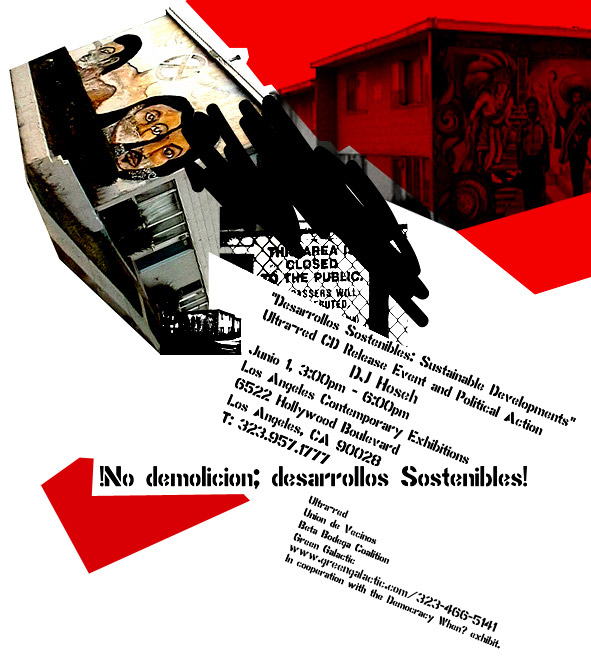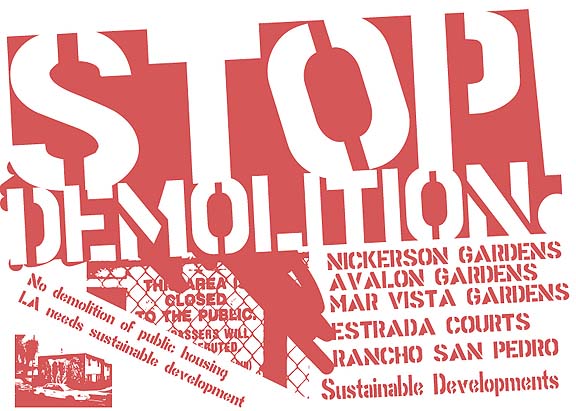ps/o3.c. desarrollossosteniblessustainabledevelopments
ps/o3 public housing | structural adjustments | re/developing the new urbanism
tracktitles
1. Vivienda Contra Autoridad* (Original)
2. Recordando a Chico* (Original)
3. El Nuevo Urbanismo (Traducción por Alejandra + Underwood)
4. Structurally Sound (Traducción por Spike)
5. Yo Vivo Aqui (Traducción por Patcha Kutek)
6. Yo Vivo Aqui (Traducción por Sony Mao via Needle)
7. Canción de la Posada (Traducción por G.R.R.L.)
8. Nunca (Spatial Deconcentration) (Traducción por Leekon)
9. Weasel Pop (Traducción por TPM)
10. Weasel Pop (Traducción por Mannequin Lung)
11. Vivienda Contra Autoridad* (Traducción por Ultra-red)
12. Recordando a Chico* (Traducción por Otto von Schirach)
releaseavailability
Released May 2002 on Beta Bodega Coalition http://www.betabodega.com/

Contra historians of forgetting, if the managers of crisis bulldoze your home you will never forget it. (A través de repeticiones de tiempo y espacio que la memoria afila afinando sus frecuencias, sintetizando sus corrientes, como se dice . . . enfocando nuestros o’dos a quien sabe que futuro.)
Contra non-profits, there is a difference between crises resolved and dialectics terminated. (La diferencia raspa la memoria de aquellos cuya miseria lubrica la maquina de la avaricia.)
Contra managers of noise, without repetition there would be no music. Neither would there be memory nor the space of struggle. There is no repetition without difference. (Es una cuestión de que se saca para quien de la escena del crimen.)
Architecture is an image of social space. The image of architecture, valued spectacularly, is the defense of eviction.
|
"Listening to the site recordings made in the projects, we became convinced that an audio investigation into public housing should by necessity attend to social space over built space. This realization significantly effected our perspective on electronic music which has long privileged the architectural oftentimes at the exclusion of the social. Working from site recordings that record space ONLY as it is lived by a community of residents, we became increasingly dissatisfied with electronica's fascination with idealist abstractions of architecture, dead cities, blueprint schematics, etc. For us, working with the Unión de Vecinos challenged us to rethink the fundamental relationship between the artist and the community." Ultra-red, "On Austerity Measures: An Open Letter to Remixers," 13 July 2000.
With these words, Ultra-red submitted their second album Structural Adjustments to the operatives of the Miami-based Beta Bodega Coalition. Musicians were sent both finished tracks from the album and the site recordings from which Ultra-red worked the original tracks.
Desarrollos Sostenibles is less a remix album than a record of translations, some faithful, others wholly inappropriate. Some translations transpose Ultra-red's methodology -- such as Alejandra y Aeron's resituated frequencies within an abandoned Spanish house destined to make way for a shopping mall. Other tracks reject that methodology for more entrenched formalist dogma. A track like G.R.R.L.'s reworking of "Canción de la Posada" carnivalizes the formalists' renunciation. In each case, the worked-over track operates like a conduit for Ultra-red's own return to the acoustic spaces of Los Angeles' public housing communities.
Constituted from audio actions taken up by the public housing residents' association Unión de Vecinos, the compact Structural Adjustments records a lost geography. The Pico Aliso projects are all but gone. Most of the lots have been reoccupied with new buildings. These buildings mark a sharp reduction in the number of families who previously lived here. Nearby, the site of the Lloyd Wright-designed Aliso Village remains a massive empty field. Promises of a June 2002 completion date fade from everyone's memory except those who once called this place home.
For the thousands of residents displaced from Aliso Village or unable to return to the greatly reduced Pico Aliso redevelopment, memory remains as irrepressible as a record. Not necessarily fixed and immutable -- but continually finding new openings in the silence.
Three years later, a new struggle is gathering its forces. As of the release of this CD, the Los Angeles Housing Authority has begun the early planning stages for the demolition of five more housing projects: Avalon Gardens and Nickerson Gardens (South Central), Rancho San Pedro (LA Harbor), Mar Vista Gardens (West LA) and Estrada Courts (East LA). Some residents displaced by the Aliso Village and Pico Aliso demolitions and relocated to Estrada Courts face the prospect of another fight against demolition.
In a fierce manifestation of dialectics, the Unión de Vecinos did not disband with the collapse of the last Aliso Village building. Rather, the Unión has been organizing new territories, embracing new antagonisms and organizing new resident activists. The Unión finds itself dispersed throughout the system like informants to a struggle whose history is only recorded in the songs and stories of those who lived it.
Operating like sonic machines, these audio translations take us back, not to a closed historical record. There are little origins remaining in these tracks either those benevolent or hostile to our political aesthetics. Ultra-red considers this a turning point. The historical record no longer documents a static past, but a route toward a contentious tomorrow.
Historical memory does an about face. Returning to the site of struggle becomes an overture, not toward the renovation of democracy, but toward its very practice.
"Public housing, as it is recorded, begs the question of who is the public? The conservative/liberal listener who defines public first in terms of ownership? For this audience, the rights to that space belong to the owner. As the government, (which, in its hyper-alienated form, can no longer be thought of as the people), owns public housing, the space belongs to an alienated government.
"To listen to recordings made in Pico Aliso and Aliso Village, another audience may be hard-pressed to find the sound of a community alienable from its social fabric. Buildings alone are mute when standing before the microphone. Public housing according to its managers, was designed by people who did not and were not going to live there. It was designed from the point of view of how some other people who would live there should use the space, not how they would use it. You can hear the lie in the silences. Especially in those recordings where the low frequency rumble of bulldozers saturates the gaps between voices, underwrites utterances and carries-over cuts in the tape." Ultra-red, "Austerity Measures: Public Housing, Community and the Record," Alphabet City Collective, editors, Lost in the Archives (Toronto, Canada 2001).
|
When the Housing Authority of Los Angeles announced in 1998 the demolition of Aliso Village, the pretext for the expulsions and demolition was a state of emergency. The housing was declared irreparably derelict. Unwilling to share their engineering reports with the residents, the bureaucrats built a daunting pro-demolition coalition enlisting support from the local Mission and the Los Angeles Times.
At the time, the Unión de Vecinos and Ultra-red launched a counter-discourse employing the language of critical globalization. The demolition and unit-reduction program, called HOPE VI, was shown to link federal funds for maintaining public housing with structural adjustment conditions. These conditions include full demolition, reductions in unit density, privatization of a percentage of the new units, and partnerships with private enterprise for the purpose of gentrifying adjacent real estate. In exchange for their eviction, residents were promised economic opportunity, gang prevention and an end to entrenched illicit drug trafficking.
"Since 1997, various government agencies, including HUD, lost some $149 billion in funds from computer systems run by DynCorp and Lockheed Martin. [Catherine Austin] Fitts suspects that Enron was a laundromat for these funds, which may have ultimately landed in the more than 700 of Enron's offshore accounts in the Cayman Islands and elsewhere. There has been no attempt by the US government to look into these accounts, despite the fact that Cayman Islands officials have invited inquiries." Larry Chin, "Tracking ÔPug' Winokur, Wolf in the Enron Fold," Online Journal, 17 February 2002, Centre for Research on Globalisation.
One need only look as far as the Enron scandal for links between globalization and the neoliberal assault on public housing communities. In 2000, Catherine Austin Fitts, former Assistant Secretary of Housing under the first Bush administration and former Republican fundraiser released a report (http://www.newsmakingnews.com/catharvardmain.htm) detailing the croney capitalism linking privitization policy advocates at Harvard, Enron corporate endowments of the same and the Department of Housing and Urban Development (HUD).
At the center of Fitts' study was DynCorp, information technology contractor for both Enron and HUD. Under contract with the Department of Justice, DynCorp managed the Drugs War's Asset Forfeiture Fund for the US and for places like Colombia. HUD was used by DynCorp to launder funds from the Asset Forfeiture operation presumably into private accounts. When Fitts' accounting firm uncovered these facts they were replaced by none other than Arthur Anderson, the same accounting recently found to have "cooked the books" for Enron. Some sources estimate that out of $149 billion in Federal funds lost in the wake of the Enron collapse as much as $59 billion has disappeared from HUD.
Notably, Fitts' initial exposure to the dealings of DynCorp and its then-Chairman Pug Winokur was in the way such companies restricted HUD's ability to provide assistance programs to communities in need. According to the Harvard intellectuals funded by Enron, the function of the state is not sustainable development or community-based assistance. The state's task is turning crisis into private capital, be that crisis in housing, energy, drugs, healthcare or democracy itself.
This complex web suggests a material link between struggles in developing economies like Argentina and marginalized communities like LA's public housing neighborhoods. While a network of New Economy architects, government privitizers and global capital have the means for extracting capital from crisis, impacted communities struggle in isolation. With the recent events in Argentina where IMF debts default has led to the collapse of the neoliberal government and massive grass roots organizing, Ultra-red have been inspired to return to the struggle against domestic Structural Adjustments.
At the same time Argentineans attempt to throw off IMF austerity, the LA Housing Authority draws up plans to demolish five more public housing projects. The exact same terms of the HOPE VI redevelopment plan that led to mass displacement and the dissolution of the Pico Aliso and Aliso Village communities five years ago are now being considered for projects across the city.
If the custodians of crisis insist on demolishing communities in order to save them, then those communities will resist. The residents of public housing demand the resources needed to maintain their own communities and sustain their own development. The answer to LA's housing crisis is not the demolition of public housing. With 5,000 new affordable housing units needed each year in Los Angeles, it is unacceptable that the HOPE VI will create more homelessness. Scammed by its corporate-raiders, HUD must be made accountable. The $50 million HOPE VI demolition funds must be used for housing renovation and expansion. The housing crisis must be resolved, not sustained in order to make money from misery.
Avalon Gardens, Nickerson Gardens, Rancho San Pedro, Mar Vista Gardens and Estrada Courts; No demolition! Sustainable development!
|

Produced and written by Ultra-red, published by ListMat (ASCAP). Additional production courtesy the translator. For source recording annotation consult the Structural Adjustments liner notes. Desarrollos Sostenibles contains two tracks not included on that album:
Vivienda contra autoridad . . . recorded at the 12 March 1999 Commissioners meeting of the Housing Authority of the City of Los Angeles. Resident activists of the Unión de Vecinos filled the small hearing chambers to protest the failure of Housing to meet with the residents and hear their complaints with the demolition/reconstruction plan for Aliso Village. The meeting began with Housing Chairwoman Ozie Gonzaque and Vice-Chair Mary Barrientos chiding the residents for their lack of respect shown the board and Executive Director, Don Smith.
Recordando a chico . . . one year later on 11 March 2000, residents of Aliso Village gathered for one last celebration of their community. While children spray-painted messages on their condemned homes, the adults gathered around photographs reminiscing about life in Aliso Village. Spoken voices include Unión members Sofia Guerrero and Josefina Castellanos.
Original tracks licensed from Mille Plateaux to Beta Bodega Coalition, except the above licensed from Comatonse Recordings. Designed by Plex, images by Ultra-red.


|



